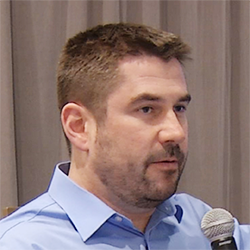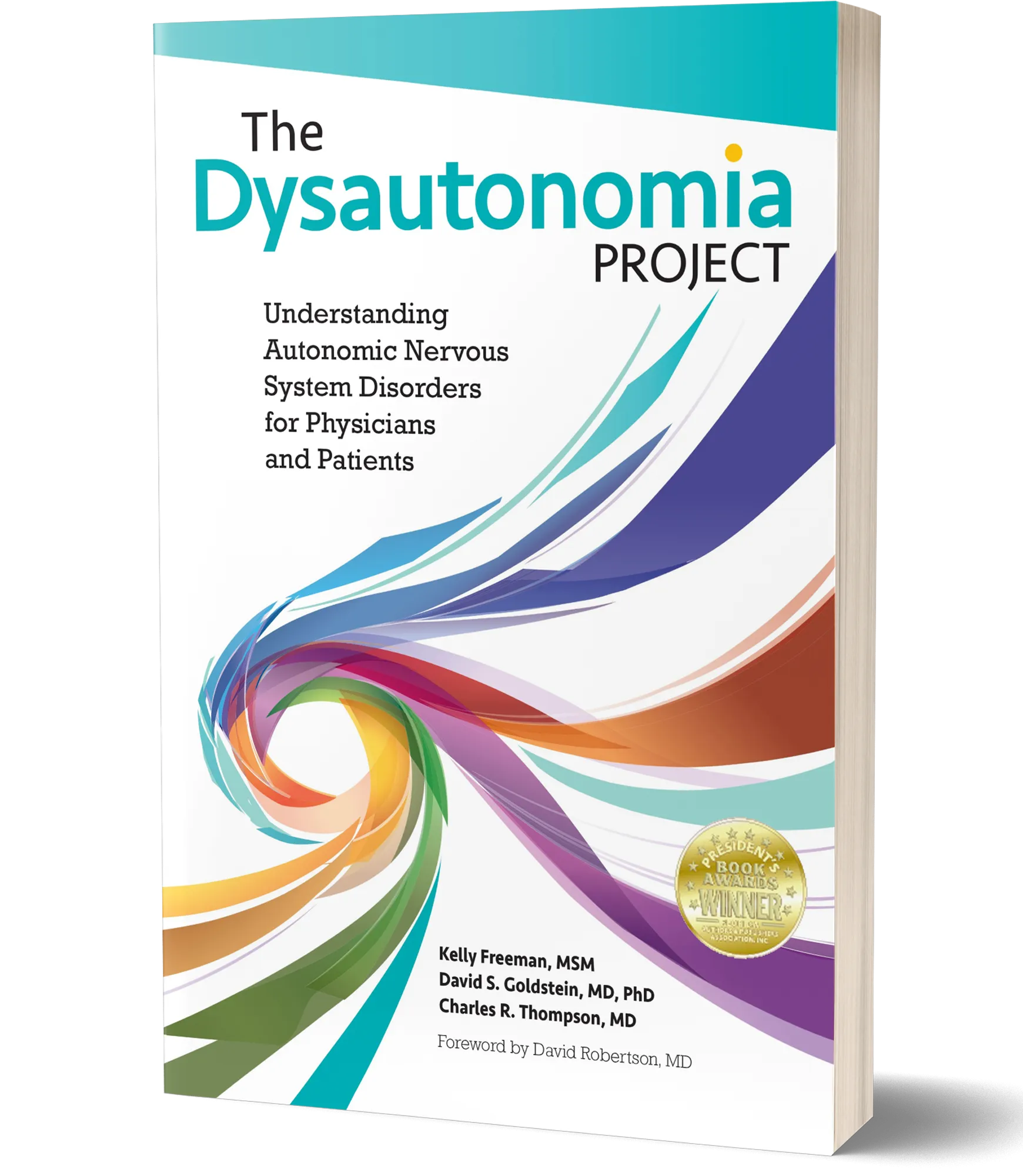Home » Dysautonomias » Autonomic Disorders in Gastroenterology and Urology Part I with G. Chelimsky, MD & T. Chelimsky, MD
Autonomic Disorders in Gastroenterology and Urology Part I with G. Chelimsky, MD & T. Chelimsky, MD
In this video Dr. Gisela Chelimsky discusses common gastroenterological problems seen in patients with autonomic disorders and Dr. Thomas Chelimsky introduces how urological problems in these same patients may have a connection.
Mr. Al Ruechel: Hi, everybody I’m Al Ruechel and this segment we’re going to be talking about two things kind of combined. We’ll be talking about urology and gastroenterology and how it all pulls together and have a unique combination that are celebrating their wedding anniversary even as we are doing this right now. Thank you so much Gisela and Tom Chlelimsky, thank you so much for your time with us.
Dr. Gisela Ghelimsky: Thank you for having us.
Mr. Ruechel: So, tell me a little bit about each of your backgrounds, thirty seconds of your background and thirty seconds of your background.
Dr. Gisela Chelimsky: So, I am a pediatric gastroenterologist and over the years I start, well even during my fellowship I started working in the autonomic nervous system, that was many many years ago, that was like in ‘94 and at that point there was no work on the autonomic nervous system and the gastrointestinal track in pediatrics so pretty much I was a pioneer in that and in 2006 we started working together combing even our clinics, Tom is a neurologist he will talk a little bit later, but we started to see kids with autonomic disorders and abdominal pain and gastrointestinal symptoms and what we thought was going to be a half a day clinic once a month ended up being our life. This is all we do right now and we see kids from all over the country that come with gastrointestinal disorders and autonomic disorders.
Mr. Ruechel: Now, it’s funny that you mention it because we have four kids and one our children for a couple of years had really, and this how far we’d gone in medicine, they’d go well it’s just growing pains he’ll grow out of it and so for two years he I think suffered a lot through it and eventually did get through it. Is it because we’re now seeing more of these things or is it because we have researchers like you who say now, we can identify what it is and now we can do something about it?
Dr. Gisela Chelimsky: You know, I think it’s both, it’s interesting we many times thought, ok is this a disorder at this time of development, where everything is in a hurry the kids are over booked but we were reading the biography of the Wright Brothers and so that was 1890 something and one of the boys ended up having one of the syndromes and he was bed ridden for two years. With, they call it and maybe I’m not quoting it correctly, histrionic disorder but he had gastrointestinal symptoms, migraines, nausea, and obviously they didn’t know what it was and it took him two or three years to get better. So, it’s not a problem of this age I think it was there all this time and we just didn’t recognize it.
Mr. Ruechel: So, before we talk about the urologist side of things and Tom, we’re not avoiding you because you’re going to get your time too here. So, are we seeing this more often now or is it like a lot of things it was always there now we have just named it and we know how to attack it?
Dr. Gisela Chelimsky: I don’t know that we know the data for that but I think that it was always there and I think that now we are recognizing it but I still think that a lot of, and I’m going to talk about the children, or adolescents, a lot of adolescents get told oh you have nothing it’s all in your head, just push through, you just don’t want to go to school, rather than understanding that the symptoms are real and they’re suffering.
Mr. Ruechel: You make me feel guilty because those are all lines I used on my kids and I’m thanking the Lord that they didn’t have these other disorders.
Dr. Gisela Chelimsky: Well, it is a good thing to push through this disorder because if you don’t continue your activities, and I’m talking about the adolescents now, usually you get more disabled. Which is a complicated message for parents because you want to be a loving, caring parent, but on the other hand if you allow them to stop doing stuff, the less you do the worse you get. So, you should not feel guilty.
Mr. Ruechel: Well thank you, that’s good to know. So, tell me about per age group does this happen more commonly, 3 to 6, 6 to 14, you know what age groups?
Dr. Gisela Chelimsky: We see it after puberty, so 12, 13-year old, predominantly females. There are some males but I would say, and this is not a statistic, but about ninety-five percent, ninety percent of my patients are females.
Mr. Ruechel: Now is this something that, it’s an autonomic problem, right? Is it still or not? Yes, no do we know?
Dr. Gisela Chelimsky: I would count it as an autonomic disorder although, I think the NIH, the National Institute of Health, now puts this under the umbrella of chronic overlapping pain conditions because what’s happening is that, and I don’t know if your child had this, it’s not just a belly pain, sometimes it’s migraines, it’s fatigue, it’s nausea, it’s aches and pains all over the body. So, for a long time this was called functional disorders and to me that has the negative connotation that oh there is nothing wrong with you.
Mr. Ruechel: Yeah, the word disorder though
Dr. Gisela Chelimsky: Yeah, and functional means we can’t find anything, we do a scope, it’s normal, we do a blood test, it’s normal, we do CT scans, it’s normal, so you have nothing, you’re making this up, and this term of chronic overlapping pain condition just means that there is a disorder where lots of symptoms come together and it’s not telling you anything about what’s the cause, or dismissing it. We believe and here is where the combination of neurology and GI plays together that this is a disorder of the brain, not a psychological disorder, but a brain disorder and we can talk more about that.
Mr. Ruechel: What are some of the things that a urologist might see in a practice that might indicate that autonomic nervous system failure or dysfunction might be related to it somehow?
Dr. Tom Chelimsky: So, yeah my name is Tom Chelimsky, I’m a neurologist and we have been, so we have two broad areas of study, one is I would say is the pediatric gastroenterology and I remember when we started our first clinic together in 2006 the next clinic was booked with two people from out of town and we asked how could that be? We never advertised that we were doing this and the internet was up and running and people found out about it very quickly about this combination. So, it’s a good way to approach these disorders because we’ve got the gut covered and the brain covered and then we talk about how the brain and the gut interact. Which is where we think, back to your question about the autonomic nervous system, where we think the autonomic nervous system is playing a role. Is the autonomic nervous system actually damaged or at fault, maybe not, maybe just the messaging between the brain and the body are not working very well. So, we sometimes talk about these particular disorders in kids as being disorders of software in contrast to disorders of hardware. So, we use that kind of analogy so this is a programming issue, your brain or your nerves need some reprograming but they’re not actually damaged. In contrast to some of the adult disorders that happen later in life like Parkinson’s disease or multiple system atrophy we term those structural or hardware disorders, the autonomic nervous system is actually being damaged, so it’s much more difficult to put a new hard drive in for example since we don’t know how to make hard drives compared to reprogramming that relates, and we’ll talk a little latter about how to reprogram, but there are ways of reprogramming the brain one of them is what Gisela just talked about which is you just have to continue what you are doing, continue exercising, continue your life, if you don’t then you actually enhance the software abnormalities.
Mr. Ruechel: Now, what I’m think in my head is that and I think that anybody that is a parent or anybody but sometimes when you get excited like when I knew I was going to do all of these interviews with all you doctors I got a little bit of pain in my stomach so there is some kind of connection between your brain and for some people it is a lot more severe that they can’t function. Now, that would be considered a normal function of, when does it snap from being a normal function to all of a sudden, it’s something more severe than just normal?
Dr. Tom Chelimsky: Well, you’re asking a great question. That’s a wonderful question. What’s normal and what’s abnormal. In this particular realm it becomes abnormal when it effects your daily life. So, we don’t have an arbitrary cutoff because we don’t have any biological markers but when the syndrome, what you’re describing sounds a little bit of IBS, irritable bowel syndrome…
Mr. Ruechel: Well sure yeah, which often times is what these people are diagnosed with or they think that’s what it is.
Dr. Gisela Chelimsky: And that’s correct, that’s the correct diagnosis
Dr. Tom Chelimsky: And so, when does it become abnormal? It becomes abnormal when you can’t perform your daily job, enjoy your daily life and it’s probably in the realm of normality when it’s a little bit of a symptom that you just manage yourself. But it’s probably still irritable bowel syndrome.
Mr. Ruechel: Well, some of this almost seems like behavior modification in a way but if it’s not, or is that right?
Dr. Gisela Chelimsky: That is correct. That is part of how we manage, so talking about the functional disorders or the chronic overlapping pain conditions and talking about the teens, the way we manage those patients is with I would say mainly three things. One is doing cognitive behavioral therapy, and I’m not a psychologist and Tom can help here, but what the psychologist does with cognitive behavioral therapy is try to understand the components of pain, right? When you have pain, part is a signal but we know that these patients when we do scopes, when we do every test that we do they’re negative, they’re normal. So, in some way, the brain is generating the pain, not making it up I mean this is not psychological but the computer is having a software problem when it is saying that signal that is coming is a threat, I need to react to this, this is concerning. When in reality, it may just be that your colon is contracting because you have to have a bowel movement, right? But in most of the people that signal doesn’t get to your conscious level, your brain manages responses and coordinates stuff without you being aware. When those signals get to your more conscious part of the brain, the brain interprets that as a threat and a patient with chronic pain disorders and then comes the fear and then comes the oh I will never get better and oh this is going to distort my life and anxiety, ok I’m going to need to poop in the middle of class and I only have four passes per year that I can go to the bathroom, you know. So, then what you do in cognitive behavioral therapy is try to dissect those components and say ok you know I understand your symptoms but you also fear for how do we work with the fear, how do we work with the anxiety component that this is producing. How do we work with you losing all of your friends because you’re not going to school, you know that sense of loss and then the psychologist reframes those signals so you can cope with them better. Would you like to add something there, Tom?
Dr. Tom Chelimsky: I think you did a beautiful job explaining it, the only thing I’m going to add is just a further analogy so people understand what we’re talking about. And I like the house alarm analogy for pain. So, the house alarm typically has two components it has a signaling component, for example if you have a motion detector a burglar comes through the motion detector and sends a signal and then the central processor receives that signal generates a loud noise, perhaps it sends a signal to the police. Now if you have your house alarm on bypass, then that signal is null and void it doesn’t go anywhere and so I explain this to patients by saying we’re going to try and get your brain on bypass and the mistake I think we’ve made for many many years is to of think pain as the signal that when the burglar goes through that signal, but that’s not pain, pain is the alarm being generated, pain is the sense that your brain interprets as being a threat. How, many times do we all bang our elbows, see a black and blue mark and say when did I do that. Obviously at that moment your brain didn’t interpret that as being a threat. So, it’s the interpretation, that Gisela talked about, of this particular sensation being a threat to you as a person, that’s what generates pain. Not the signal itself.
Mr. Ruechel: Wow, that does help you understand it when pain is, yeah that’s very interesting. So, lastly when people come to your clinic what is, what I call, the ideal outcome when they get done?
Dr. Gisela Chelimsky: So, what we do is we explain this, and we tell them, and when we deal with teens, we tell them that this is a software problem and they get it much better than the adults because they are so computer literate. And the other thing that we tell them, and you know I see a whole spectrum from kids that just have the belly pain but they are going to school, they get dizzy but life is going on, to the kids that have been bed ridden for 4-5 months and they can’t even get up from bed and they come in wheelchairs. So, we tell them this is a software problem you already were scope and had tests done by 20 people I’m opinion number 5, I’m not going to repeat those tests they’re not going to be abnormal. How do we help you? And so here it is we need to work with this cognitive behavioral therapy dissect your pain sensation, what really is that but we also need to get you activated, we need to get you moving, the worst thing you can do is be in bed.
Mr. Ruechel: Which is what you want to do.
Dr. Gisela Chelimsky: And what everybody as a parent does, you know your kid feels sick, nauseous, is weak, ok sweetie let me bring you breakfast, just stay in bed and then your postural tachycardia gets works you get deconditioned, everything gets worst. If you are bed ridden you are going to develop postural tachycardia, if you didn’t have it before. Your pain signals, your pain threshold decreases you perceive pain now with much less. So, the first thing we need to do is let’s start getting you up from bed and sometimes we do baby steps, ok I just saw a patient the other day and she has been bed ridden and I said ok I want you just sitting, I’m not asking you to walk around I just want the legs hanging down so we have that orthostatic challenge so you don’t totally decondition. The next step I’m going to do is let’s get you to walk a little, and we work a lot with physical therapy.
Dr. Tom Chelimsky: And sometimes in water
Dr. Gisela Chelimsky: Yeah and water has no gravity so water is a good place to start exercising.
Mr. Ruechel: And You know it’s interesting because we’ve been talking to some other people and this is exactly the remedy we’re talking about a little later today about that whole idea of discipline.
Dr. Tom Chelimsky: So, let me just say a couple words about the bladder.
Mr. Ruechel: Ok
Dr. Tom Chelimsky: And this is really for urologists and general physicians. When someone is if you’re a urologist in your office and someone comes in and they happen to have Parkinson’s disease or multiple system atrophy or POTS, and these are all questions as a urologist that you need to ask. Do you have a neurologic disorder in the background? If they, do be careful about assuming that you have a fifty-five year old male who is coming in with some urinary hesitancy be careful about jumping to the concussion that they have prostatic hypertrophy, my recommendation is work with the neurologist, just figure out whether this is part and parcel of the neurologic syndrome they have before you jump in and do maybe a prostatic operation to try and open things up. Because if this is part of the neurologic syndrome and this takes a lot of careful testing probably what we call urodynamic testing and other ways of looking at how the bladder is working and actually looking by ultrasound at the prostate and the what we call the outlet. If you don’t do that you may wind up doing an operation and you actually don’t help the person. And so, you have to be very careful about whether they have a pure, true structural urologic disorder or whether they have a neurologic disorder that’s mimicking a structural disorder so that’s one thing I would say. The other thing I would add to that is the drugs we have available for outlet obstruction of the prostate and so on and so forth can also be very helpful if it’s a neurologic problem. So, by all means give those a try, but just be aware of one thing, the urethra is a hollow tube and it reacts pretty much identically to blood vessels which are also hollow tubes, so if you give something that is going to dilate the urethra and the person has orthostatic hypotension and can pass out, you’re going to dilate those blood vessels so now they are going to pass out or they may pass out. So, you have to be careful about that overlap and these are typically called alpha adrenergic blockers and if you use an alpha adrenergic blockers be careful that you’re working with the neurologist or with the cardiologist, whoever is managing the blood pressure, so that you’re not working against each other. So, that’s an important point. The last point I want to make is that it’s not impossible to use an alpha blocker but you have to add salt and the urologist, I’m not telling the urologist to add salt I’m just saying be aware that you could use the alpha blocker if it’s going to help them use their bladder you just have to compensate a little bit by adding a little bit of salt.
Mr. Ruechel: Great, did we get everything?
Dr. Tom Chelimsky: So, the last thing we could talk about is pelvic pain and the autonomic nervous system.
Mr. Ruechel: OK, we’ll have to make this fairly brief. So, tell me about that.
Dr. Tom Chelimsky: Because remember we have twice the time. So this is really on just current current research, we just published a paper that shows that some disorders, pain disorders, of the pelvic area, namely interstitial cystitis, which is where your bladder is constantly in pain and you’re constantly going to the bathroom and some people are bladder bound or toilet bound they have to always be in a place where they can be in the toilet. That group seems to have an abnormality of the Vagus function. Whereas, the group that has myofascial pelvic pain, which is where the muscles all tighten up and they have terrible pelvic pain also, seems to have an abnormality of the fight or flight system what we call the sympathetic system. And so, these two disorders while they seem or feel similar actually, we’re beginning to dissect them a little bit. So just kind of a heads up this is what’s coming down the pipe and we may in a couple years have more understanding of how these disorders differ from one another. And this is work we’re doing together in an NIH funded study.
Mr. Ruechel: That’s wonderful alright, boy I digested a lot and I think I understand most of it. But that’s the amazing part. Hey thank you for your time and keep up the good work we really appreciate what you do in your practice.
Dr. Gisela Chelimsky: Thank you for having us
Dr. Tom Chelimsky: Thanks for having us.

Wolfgang Singer, MD
Associate Professor of Neurology
Mayo Clinic Rochester, MN































